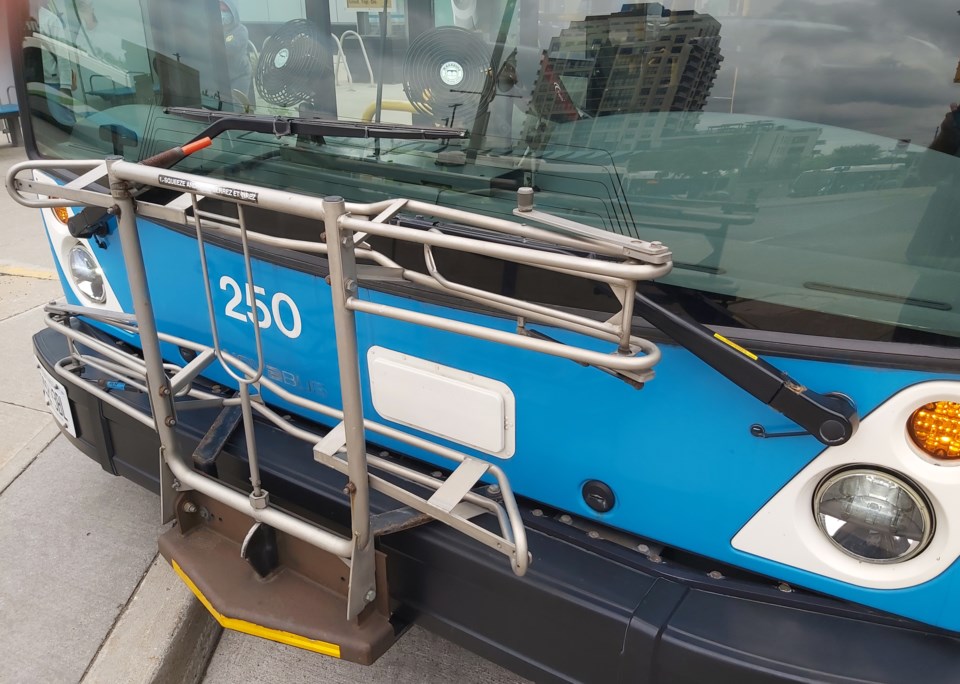If one more thing goes wrong at an airport, any airport, for anything, there are only two possible fates for Transport Minister Omar Alghabra: He’s either going to have a show trial on cable news while standing in the stocks or he’s going to be run out of Canada by a pick-up truck full of yokels playing loud banjo music.
Now airplane stuff is important, and it’s complicated, but how many of us are affected by the intricacies of air travel on a daily basis, or even on a yearly basis for that matter?
That’s right, it’s time again to talk about local transit issues.
This rant was teed up by a New Year’s media interview with Mayor Cam Guthrie where he said that he was planning to bring forward a motion at this month’s budget meeting to have city staff look at expanding free transit to high school-aged teens and seniors.
That’s nice. It’s one of those things that a politician says because there’s no consideration beyond the surface level question of who would be against this? Well guess what…
Now, there was a report to council in December that said the first seven months of the Kids Ride Free pilot was a “great success.” Success though comes at a cost because the report explained that the growing number of young people using the program could have a projected financial impact of $102,911 (a 0.04 per cent levy increase) for 2023 and that could further increase to $117,072 in 2024.
In a $500-million city budget, these are relatively small potatoes, but transit as a city service is also considered relatively small potatoes. It’s long been the low hanging fruit of the corporation and historically transit’s always been the first to be cut and the last to receive support.
And that’s to say nothing of the fact that transit is routinely the only city department that has seen council publicly demand that it carry its own weight. A lot of council’s focus in the past has been on this ratio of how much of Transit’s budget comes from base support and how much comes from the fare box.
For years, progress on improving transit has been stymied because councillors have thought that too much money has come from the former, and not enough has come from the latter and that debate never acknowledged the Catch-22 of the situation: More people won’t take transit until it improves, and it won’t improve until more people take transit.
So given council’s past of demanding that transit pay for itself, I’m really wondering why we’re thinking about making transit free for more people? I have some ideas.
First, there’s the crux of the city’s issue in promoting modal split, which means the goal of getting more people out of their cars and into a different mode of travel. Everyone thinks there should be fewer cars on the road, so long as they don’t have to be one of the people that gives up their car.
Even the city’s own sponsored events can’t come up with a solution to this conundrum. Last summer, planner Brent Toderian said that Guelph needs to reduce car dependency, but he didn’t have any helpful suggestions about encouraging people to leave their cars at home. For that matter, after all these years, I’ve yet to find someone that does.
Before that, planner Jennifer Keesmaat proposed car-free neighbourhoods, which got big cheers from city leaders before everyone left that event in their own private automobiles even though the venue was within a five-minute walk of eight different transit stops.
I can’t tell you how many environmental protests, activist events, or “Green New Deal” town halls I’ve been to where the parking lot was full. If you can’t get the tree huggers on transit, what hope is there for the rest of us?
The second problem with the mayor’s proposal to expand free transit is that it targets the exact constituency that already takes transit: young people who can’t drive yet, and old people who can’t drive anymore.
Class warfare is the one aspect of transit no one wants to talk about, because who’s going to use Guelph Transit if they don’t have to; the routes are inefficient, the schedules are infrequent, and the options are extremely limiting. And even if you can get around town, there are precious few regional transit options, and many of the options that do exist are themselves incredibly inefficient.
The dirty truth – and many in leadership at the City of Guelph know this even if they never say it – is that if you’re an active and successful professional in Guelph then transit is not even a consideration when it comes to moving around town. Those people are more likely to focus on biking and trails than the gross inadequacies of transit.
That’s why all the politicians are posting social media snaps of them biking around town, and you never see them posting from a Guelph Transit vehicle. It’s also why the Downtown Guelph Business Association marks Guelph Central Station as a place you can get a GO Train on their online map and not as a place where you can get a Guelph Transit bus. The inherent message is that downtown aspires to be “too upscale” for people who use local transit.
To bottom line this, I would much rather pay for a transit system that people want to use than take the current system for free. We still have well-used transit stops in this town that are a poll in the muddy ground at the side of a busy street with no shelter around, which, to me, is the perfect metaphor for how seriously we want transit to be appealing to people.
